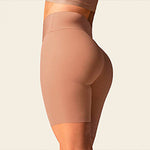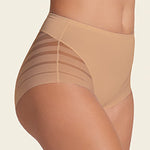How To Avoid Loose Skin After Weight Loss

If you’ve recently lost or are in the process of losing excess weight after pregnancy, surgery, or lifestyle changes, you may be feeling lighter, more energetic, and more confident. These are all wonderful things to celebrate! With this change, some people experience loose, sagging skin after weight loss, and this can affect their comfort, mobility, and self-esteem. The good news is that, with dedicated effort, care, and treatments, it’s possible to avoid or improve this condition and prevent or eliminate its effects.
How Your Skin Keeps Its Shape
Your skin protects your body from harm and adapts as your shape changes throughout your lifetime. It’s supported by proteins like collagen, which promotes firmness, and elastin, which helps the skin stretch and contract. When you gain weight, your skin expands to make room for new tissue. If it stays stretched out for a long time, the elastin and collagen fibers can weaken, so your skin becomes less supple and firm and loses its ability to snap back after extreme changes.
Weight loss affects people differently, but often, the older you are and the more weight you lose, the harder it will be for your skin to revert to its original state. After weight loss, your skin may take several months to shrink back to its original shape, and if your collagen fibers are damaged, you may be left with loose skin.
What Factors Contribute to Your Skin’s Condition?
During and after your weight loss journey, it’s important to understand loose skin and its underlying causes. Here are a few things to consider when trying to avoid loose skin after weight loss.
Gradual Weight Loss
Healthy, long-term weight loss usually takes time. If you lose a moderate to large amount of weight quickly, you may end up with loose skin that hangs from your body, especially if you lose 100 pounds or more. Gradual weight loss is the best way to avoid sagging skin because your body will be able to adapt to your new weight over time. You’ll also be less likely to lose muscle as you approach your target weight. Many experts suggest that you try to lose 1 to 2 pounds a week, or no more than 8 pounds per month, to ensure that your skin will look its best.
Age and Genetics
As you age, your skin produces less collagen and becomes less resilient, which makes it more likely to sag after you lose weight. Your genes are another influence on how firm your skin will be after weight loss, so some people are naturally inclined toward having loose skin.
Sun Exposure
If you regularly spend time outside without wearing sun protection, your skin may hang loose after weight loss. Repeat exposure to ultraviolet rays can damage the collagen fibers deep within your skin and make them less able to recover.
Smoking
Smoking can accelerate the aging process by exposing your body to chemicals that destroy collagen and elastin. To prevent future damage to your skin and promote healing, stop smoking. Over time, your skin may regain some of its elasticity.
Natural Ways To Tighten Your Skin
Having loose skin after losing weight is very common, but it doesn’t have to be a certainty. Exercise can help you tighten and tone your body, and good nutrition and hydration can improve your skin’s elasticity so that it responds more quickly to your weight loss. Good sleep habits can even encourage your body to heal itself more quickly, which may lead to better skin.
Prioritize Fitness
Exercise can help you reduce body fat, build muscle and improve circulation, which can help your skin look its best. A combination of cardiovascular activity, strength training with weights, and resistance training like push-ups, planks, and squats can help you burn calories, build muscle, and tone your physique, especially your back, shoulders, arms, and legs.
Changing your body composition can improve the appearance of your skin and help fill it out, which can make it look tighter. Weight training that builds your muscles can give your silhouette a new shape and raise your metabolism. Muscle burns about three times as many calories as fat, which means that the more muscle you have, the more calories you will burn during the day. Working out can increase blood flow, which helps oxygenate and nourish your cells and may boost collagen production, leading to firmer-looking skin.
Improve Your Diet
If you want your skin to be youthful and smooth, eating a balanced, natural, protein-rich diet may help. Foods rich in protein, such as beans, yogurt, meat, bone broth, poultry, and fish, are packed with amino acids like proline, hydroxyproline, and glycine. These amino acids can stimulate collagen growth. Whole, minimally processed foods that provide you with vitamins A, C, and E and minerals like copper and zinc help your body make new collagen. Fresh fruits and vegetables contain polyphenols and carotenoids that may help improve elastin production in the body. Foods that contain unsaturated and polyunsaturated fatty acids can help nourish your skin and keep it healthy.
Stay Hydrated
Keeping your body well hydrated can have a direct effect on your skin’s collagen levels. Properly hydrated skin is more flexible than dehydrated skin. Dehydration can cause your connective tissues and collagen fibers to lose access to water, which can cause their strands to deteriorate and lead to a loss of firmness in your skin. To help your skin restore itself after weight loss, drink plenty of water and electrolyte-enhanced beverages. Other good sources of hydration include herbal teas and citrus, mint, or cucumber-infused water. Track your water intake and try to consume 64 to 100 fluid ounces per day.
Get Plenty of Sleep
If you want to improve the health of your skin and encourage it to stay tight and firm, get your beauty sleep! When you rest, your body works to repair any cellular damage that occurs during the day. Sleep helps to reduce stress and regulate your hormones, which can contribute to better-looking and more supple skin.

Try Supplements, Skin Care, and Shapewear
When you want to give your skin a boost, supplements, topical skin care, and shapewear can go a long way toward improving the look and feel of your skin and shaping your silhouette.
Use Collagen Supplements
Some experts believe that taking oral collagen supplements may counter the negative impact of weight loss on your skin by replenishing your body’s natural collagen, especially as you age. After you lose weight, these supplements may help keep skin moist, improve tightness and elasticity, and help minimize the appearance of stretch marks. Remember that supplements are not always regulated for safety and efficacy, so check with your doctor for recommendations.
Apply Topical Skin Care Treatments
Firming creams are skin care products that contain collagen or elastin and provide hydration to give skin a firmer look. They are designed to plump up and tighten loose skin, but their effects are temporary. Using treatments containing glycolic acid or salicylic acid may also help your skin build more collagen and increase firmness. Some retinol-based topical body creams may improve the condition of your skin’s elastin. When you go outside, it’s important to apply sunscreen rated SPF 30 or higher to any exposed area of your body to prevent future damage that can make your loose skin even worse.
Wear Shapewear and Compression Garments
When you want to show off a sleek new silhouette, wearing shapewear and compression garments can help you look and feel your best. Wearing foundations like waist cinchers, shaper shorts, and full-compression bodysuits encourage your loose skin to stay in place and regain its shape. These garments can help keep you comfortable and prevent irritation, chafing, and infection.
Compression garments can also enhance your skin texture by improving your circulation, which helps to bring oxygen and nutrients to your skin cells. Perhaps best of all, wearing shapewear can complement your other self-care efforts and give your silhouette a boost. Although no garment can tighten your skin on its own, good shapewear can help you feel more confident! These foundational garments can help you feel good about yourself as your skin recovers from weight loss.
Medical Treatments
While diet, exercise, and self-care treatments can help tighten skin after weight loss, they take time to work and sometimes leave people dissatisfied. Many people who worry that they will continue to have too much loose skin opt to have medical treatments such as radiofrequency treatments or body-contouring surgery to refine their appearance.
It’s important to maintain a stable weight for several months before undergoing a skin-tightening medical treatment. If your weight changes after a body contouring procedure, your skin may change for the worse, and you may have to repeat the procedure, which could negatively affect your health and appearance. Many experts recommend waiting six to 18 months after reaching your goal weight and holding steady before undergoing any body contouring treatments.
Noninvasive and Minimally Invasive Skin Tightening Procedures
If you’d like to treat your loose skin without surgery, you have several noninvasive and minimally invasive options to choose from. Radiofrequency, infrared light, laser light, and suction-based skin tightening procedures can help your body create new collagen and elastin, which can increase its flexibility and improve its tone. Some procedures work by heating the tissue under your skin to cause it to contract and shrink. It can take three to four months to see the full effects of your treatment.
Body-Contouring Surgery
If you’re worried that your skin will never recover from your weight loss, you might want to speak to your doctor about having body-contouring surgery. Procedures such as arm lifts, breast lifts, tummy tucks, medial thigh lifts, and lower and upper body lifts involve removing extra skin from specific areas of your body. They also tighten your remaining skin and improve your body shape to give you a smoother silhouette. Your doctor will perform the surgery in the hospital under general anesthesia and use small stitches whenever possible to minimize scarring. Recovery may take several weeks or months, and you will usually be instructed to wear post-surgery shapewear to minimize swelling and promote healing.

Leonisa Can Help You Look Your Best After Weight Loss
When you’re concerned that loose skin will keep you from looking and feeling your best, you’ll want to do all you can to keep it at bay. Patience, exercise, good nutrition, and self-care can help your skin recover its resilience, and cosmetic treatments can provide noticeable restorative effects. As you’re working toward your goals, great shapewear can help you enjoy your new body by sculpting and smoothing your silhouette. With the right compression garments, you can easily wear that cute new outfit and show off your fabulous shape.














